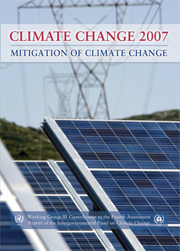 Climate Change 2007 - Mitigation of Climate Change
Climate Change 2007 - Mitigation of Climate Change Book contents
- Frontmatter
- Contents
- Foreword
- Preface
- Summary for Policymakers
- Technical Summary
- 1 Introduction
- 2 Framing issues
- 3 Issues related to mitigation in the long term context
- 4 Energy supply
- 5 Transport and its infrastructure
- 6 Residential and commercial buildings
- 7 Industry
- 8 Agriculture
- 9 Forestry
- 10 Waste management
- 11 Mitigation from a cross sectoral perspective
- 12 Sustainable Development and mitigation
- 13 Policies, instruments and co-operative agreements
- Annex I Glossary
- Annex II Acronyms, abbreviations and chemical compounds
- Annex III List of contributors
- Annex IV List of reviewers
- Index
10 - Waste management
- Frontmatter
- Contents
- Foreword
- Preface
- Summary for Policymakers
- Technical Summary
- 1 Introduction
- 2 Framing issues
- 3 Issues related to mitigation in the long term context
- 4 Energy supply
- 5 Transport and its infrastructure
- 6 Residential and commercial buildings
- 7 Industry
- 8 Agriculture
- 9 Forestry
- 10 Waste management
- 11 Mitigation from a cross sectoral perspective
- 12 Sustainable Development and mitigation
- 13 Policies, instruments and co-operative agreements
- Annex I Glossary
- Annex II Acronyms, abbreviations and chemical compounds
- Annex III List of contributors
- Annex IV List of reviewers
- Index
Summary
EXECUTIVE SUMMARY
Post-consumer waste is a small contributor to global greenhouse gas (GHG) emissions (<5%) with total emissions of approximately 1300 MtCO2-eq in 2005. The largest source is landfill methane (CH4), followed by wastewater CH4 and nitrous oxide (N2O); in addition, minor emissions of carbon dioxide (CO2) result from incineration of waste containing fossil carbon (C) (plastics; synthetic textiles) (high evidence, high agreement). There are large uncertainties with respect to direct emissions, indirect emissions and mitigation potentials for the waste sector. These uncertainties could be reduced by consistent national definitions, coordinated local and international data collection, standardized data analysis and field validation of models (medium evidence, high agreement). With respect to annual emissions of fluorinated gases from post-consumer waste, there are no existing national inventory methods for the waste sector, so these emissions are not currently quantified. If quantified in the future, recent data indicating anaerobic biodegradation of chlorofluorocarbons (CFCs) and hydrochlorofluorocarbons (HCFCs) in landfill settings should be considered (low evidence, high agreement).
Existing waste-management practices can provide effective mitigation of GHG emissions from this sector: a wide range of mature, environmentally-effective technologies are available to mitigate emissions and provide public health, environmental protection, and sustainable development co-benefits. Collectively, these technologies can directly reduce GHG emissions (through landfill gas recovery, improved landfill practices, engineered wastewater management) or avoid significant GHG generation (through controlled composting of organic waste, state-of-the-art incineration and expanded sanitation coverage) (high evidence, high agreement).
- Type
- Chapter
- Information
- Climate Change 2007 - Mitigation of Climate ChangeWorking Group III contribution to the Fourth Assessment Report of the IPCC, pp. 585 - 618Publisher: Cambridge University PressPrint publication year: 2007


